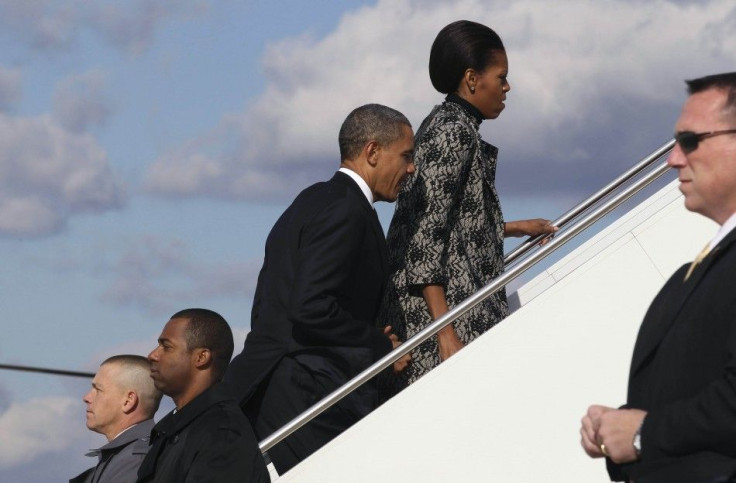Obama Embarks upon Week of Diplomacy in Asia

As night settled over the Group of 20 meetings in Cannes, France, President Barack Obama reset his gaze East, where he believes the sun is rising on a new era of American economic growth through international cooperation.
After the pageantry and somber morning of Veterans Day, Obama boarded Air Force One, bound for Honolulu (taking in a college basketball game along the way). The trip kicks off a week of delicate diplomacy, signaling the administration's goal of shifting part of the United States' still-considerable economic heft to Asia.
The timing could not be more aesthetically apropos. After the announced draw down of troops from the Middle East, the Eurozone crisis and a G20 summit that lacked spectacular developments, the Obama administration is hoping enhanced economic ties with the Pacific Rim will open a fruitful venue for enduring growth -- and may be just enough to kick start a stalled economy.
To have this trip happen when you have nothing but crisis in Europe and nothing but opportunity in Asia, you couldn't have more of a juxtaposition, Victor Cha, a scholar at the Center of Strategic and International Studies, told Reuters.
High-Profile Meetings
The President's itinerary reads like a targeted Who's who? of rising and reigning Asian powers. Dual weekend summits, the Asia-Pacific Economic Cooperation summit in Honolulu and the East Asia Summit in Bali, Indonesia, bookend a trip that will see him meet with the leaders of Australia, China, India, Indonesia, Japan, Malaysia, the Phillipines, Russia and Thailand.
All are necessary for America's continued global economic growth. And all, Obama hopes, will be receptive to improving relations.
Obama's outlook was recently outlined by Secretary of State Hillary Clinton in Foreign Policy.
In the next 10 years, we need to be smart and systematic about where we invest time and energy, so that we put ourselves in the best position to sustain our leadership, secure our interests, and advance our values, Clinton wrote. One of the most important tasks of American statecraft over the next decade will therefore be to lock in a substantially increased investment -- diplomatic, economic, strategic, and otherwise -- in the Asia-Pacific region.
Asia: Rising in Importance
The Secretary of State points to Asia's economic rise (by some measures, it already dominates) as a reason to be engaged with the other side of the Pacific, after more than a decade of mostly shared goals and progress across the Atlantic.
At a time when the region is building a more mature security and economic architecture to promote stability and prosperity, U.S. commitment there is essential, she wrote. (Her commitment, it should be noted, is sterling. Clinton broke with tradition by pointing her compass East for her maiden diplomatic voyage. She has been there eight times in total).
The renewed U.S. focus will try to strengthen investment, foster shared economic goals, military cooperation and advocate human rights and democracy. Given the region's checkered history in some of those areas, especially human rights, Obama is expected to walk delicately over the next week.
Clinton started off the summit on Thursday by making a call upon China to end a history of dicey human rights policies, and open the door for U.S. and foreign companies.
Some in our country see China's progress as a threat to the United States, while some in China worry that America seeks to constrain China, Clinton said. In fact, a thriving American is good for China and a thriving China is good for America.
Obama will host leaders of the 21-member APEC, including Chinese president Hu Jintao, during the first weekend's summit in Hawaii, focusing on economic ties within the region. Boeing, Caterpillar, GE and others will send their executives, to help Obama push for greater economic cooperation.
Possible New Trade Agreement Announcement?
During the summit in Hawaii, the President is expected to unveil the broad outlines of a breakthrough trade pact, according to the AP, which may open up new markets to American exports.
Obama will announce the beginning of joint military training exercises between the Aussies and the U.S. during a mid-week stop in Australia, which could preclude a broader deal to allow U.S. naval forces to be stationed down under. The move is also seen as a nod to China, sending the message that the U.S. won't cede diplomatic and controlling economic interests in the region.
The second summit, a discussion on security, has some expecting Obama to draw attention to Malaysia, the Philippines, Thailand, Indonesia and India.
Obama's trip itself comes at a sensitive time for the U.S., as a Congressional super committee approaches a Nov. 23 deadline to find $1.2 trillion in budget deficit savings. Should they fail, admittedly painful cuts will be triggered, swiping away funding from defense and Medicare expenditures over the next decade.
Obama will have to bat off accusations of being AWOL at a time when he should step in and mediate the super committee's stalled talks.
Clinton calls the efforts to lambaste the President's work misguided.
Those who say that we can no longer afford to engage with the world have it exactly backward -- we cannot afford not to, she wrote. Our work abroad holds the key to our prosperity and security at home.
The administration is banking on a boost from Asia to help the American economy.
Asian economies will need to do more to stimulate domestic demand growth -- both so they are less vulnerable to slowdowns, such as the situation in Europe, and so they can continue to contribute to global growth, said U.S. Treasury Secretary Timothy Geithner, according to The AP.
© Copyright IBTimes 2024. All rights reserved.





















